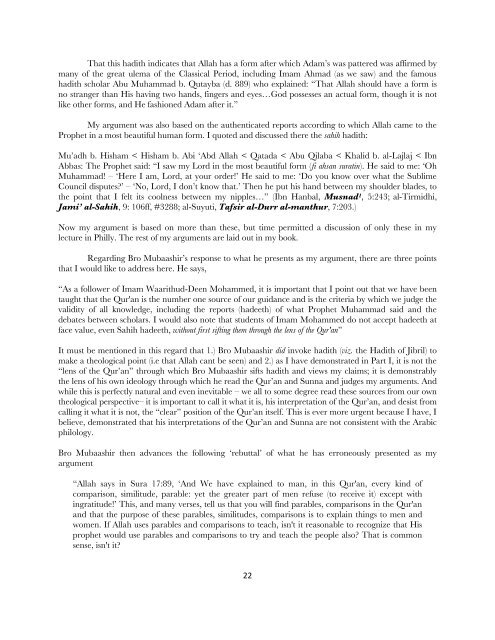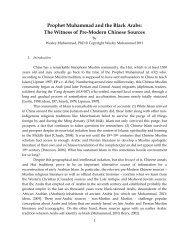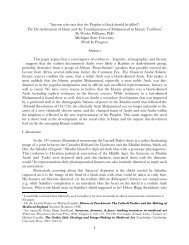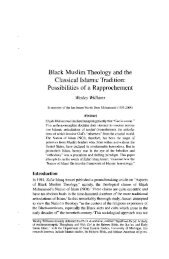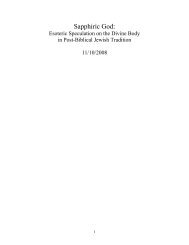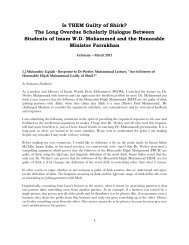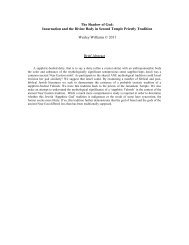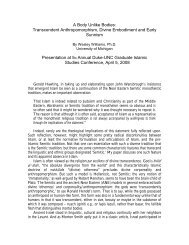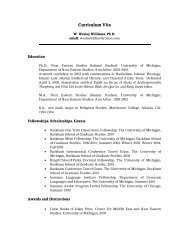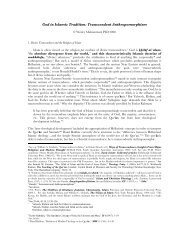Is THEM Guilty of Shirk? - Dr. Wesley Muhammad
Is THEM Guilty of Shirk? - Dr. Wesley Muhammad
Is THEM Guilty of Shirk? - Dr. Wesley Muhammad
Create successful ePaper yourself
Turn your PDF publications into a flip-book with our unique Google optimized e-Paper software.
That this hadith indicates that Allah has a form after which Adam‘s was pattered was affirmed by<br />
many <strong>of</strong> the great ulema <strong>of</strong> the Classical Period, including Imam Ahmad (as we saw) and the famous<br />
hadith scholar Abu <strong>Muhammad</strong> b. Qutayba (d. 889) who explained: ―That Allah should have a form is<br />
no stranger than His having two hands, fingers and eyes…God possesses an actual form, though it is not<br />
like other forms, and He fashioned Adam after it.‖<br />
My argument was also based on the authenticated reports according to which Allah came to the<br />
Prophet in a most beautiful human form. I quoted and discussed there the sahih hadith:<br />
Mu‘adh b. Hisham < Hisham b. Abi ‗Abd Allah < Qatada < Abu Qilaba < Khalid b. al-Lajlaj < Ibn<br />
Abbas: The Prophet said: ―I saw my Lord in the most beautiful form (fi ahsan suratin). He said to me: ‗Oh<br />
<strong>Muhammad</strong>! – ‗Here I am, Lord, at your order!‘ He said to me: ‗Do you know over what the Sublime<br />
Council disputes?‘ – ‗No, Lord, I don‘t know that.‘ Then he put his hand between my shoulder blades, to<br />
the point that I felt its coolness between my nipples…‖ (Ibn Hanbal, Musnad 1, 5:243; al-Tirmidhi,<br />
Jami’ al-Sahih, 9: 106ff, #3288; al-Suyuti, Tafsir al-Durr al-manthur, 7:203.)<br />
Now my argument is based on more than these, but time permitted a discussion <strong>of</strong> only these in my<br />
lecture in Philly. The rest <strong>of</strong> my arguments are laid out in my book.<br />
Regarding Bro Mubaashir‘s response to what he presents as my argument, there are three points<br />
that I would like to address here. He says,<br />
―As a follower <strong>of</strong> Imam Waarithud-Deen Mohammed, it is important that I point out that we have been<br />
taught that the Qur'an is the number one source <strong>of</strong> our guidance and is the criteria by which we judge the<br />
validity <strong>of</strong> all knowledge, including the reports (hadeeth) <strong>of</strong> what Prophet <strong>Muhammad</strong> said and the<br />
debates between scholars. I would also note that students <strong>of</strong> Imam Mohammed do not accept hadeeth at<br />
face value, even Sahih hadeeth, without first sifting them through the lens <strong>of</strong> the Qur'an‖<br />
It must be mentioned in this regard that 1.) Bro Mubaashir did invoke hadith (viz. the Hadith <strong>of</strong> Jibril) to<br />
make a theological point (i.e that Allah cant be seen) and 2.) as I have demonstrated in Part I, it is not the<br />
―lens <strong>of</strong> the Qur‘an‖ through which Bro Mubaashir sifts hadith and views my claims; it is demonstrably<br />
the lens <strong>of</strong> his own ideology through which he read the Qur‘an and Sunna and judges my arguments. And<br />
while this is perfectly natural and even inevitable – we all to some degree read these sources from our own<br />
theological perspective– it is important to call it what it is, his interpretation <strong>of</strong> the Qur‘an, and desist from<br />
calling it what it is not, the ―clear‖ position <strong>of</strong> the Qur‘an itself. This is ever more urgent because I have, I<br />
believe, demonstrated that his interpretations <strong>of</strong> the Qur‘an and Sunna are not consistent with the Arabic<br />
philology.<br />
Bro Mubaashir then advances the following ‗rebuttal‘ <strong>of</strong> what he has erroneously presented as my<br />
argument<br />
―Allah says in Sura 17:89, ‗And We have explained to man, in this Qur'an, every kind <strong>of</strong><br />
comparison, similitude, parable: yet the greater part <strong>of</strong> men refuse (to receive it) except with<br />
ingratitude!‘ This, and many verses, tell us that you will find parables, comparisons in the Qur'an<br />
and that the purpose <strong>of</strong> these parables, similitudes, comparisons is to explain things to men and<br />
women. If Allah uses parables and comparisons to teach, isn't it reasonable to recognize that His<br />
prophet would use parables and comparisons to try and teach the people also? That is common<br />
sense, isn't it?<br />
22


